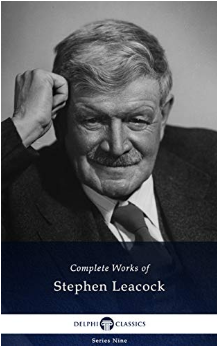Colby Cosh from the Friday edition of the NP Platformed newsletter:
In his Substack newsletter this morning, the editor/historian Ken Whyte shares a neat discovery: a publisher called Delphi Classics has made the complete works of Stephen Leacock available in a Kindle edition for the exquisitely reasonable price of $3 (Canadian!).
Leacock’s oeuvre is in the public domain, so technically you could save the money for a down payment on a coffee. But Delphi is said to take professional care in collating and editing public-domain works of past masters, and it would have to do a pretty poor job not to make it worth the $3 to have 10,000-plus pages in readable condition and in one file.
The collection includes Leacock’s non-fiction, which appears to make up about half its volume. I am just old enough to have run across the humorous fiction that made Leacock a global celebrity, one who influenced artists ranging from F. Scott Fitzgerald to Groucho Marx. I know next to nothing of him as an economist, which was his everyday trade (his thesis supervisor was Thorstein Veblen). He also wrote history books about early Canada, and one’s instinct is that these must be lively presentations of material that Canadians ordinarily meet in the worst possible circumstances, and yes, I do mean “a classroom.”
I have to doff the editorial “we” here to confess that I have not plumbed very deeply into the many aspects of Stephen Leacock, even as someone who regards him, on the basis of Sunshine Sketches of a Little Town and other much-anthologized stories, as easily the greatest prose artist in Canada’s history. Leacock is our Mark Twain, and it’s a small miracle that we have someone who could be described this way, without any hint of exaggeration or partiality. (Commercially, at his peak, Leacock enjoyed nearly the same level of renown: the joke was that he was better known than Canada itself.)
His humorous short stories, like Mark Twain’s, overflow with cynicism and masked darkness, matched with an equal quantity of sympathy. His ability to find just the right off-kilter adjective to make a sentence’s logic explode or capsize was just as strong. And, in his day, the small-town Canadian life he satirized was nearly the entirety of Canadian life, period. You can learn things about early 20th-century Canada from Leacock, and maybe some things about your own forebears, that nobody could insert into a serious book.
Despite having spent most of my school years in Canada, I can only think of one or two Leacock stories that I had to read in that time … and I’m afraid like most things we’re forced to read, I resented the hell out of the teacher, the school board, and the author so if I actually did read them, I instantly forgot them as soon as the quiz or test was over and had no intention of ever picking up the author’s work again. This general pattern has been handy for me in that the Canadian authors I’ve read in the decades since then I’ve been able to evaluate on their own merits rather than through the “I already hate you” filter that got applied to assigned texts in school. My friend and former co-worker Jon — who used to comment on the blog occasionally — was a big fan of Leacock and regularly encouraged me to get past the ancient resentments … it worked to the point that I bought a copy of Sunshine Sketches, but I still haven’t gotten around to reading it.




